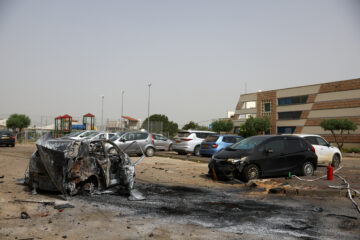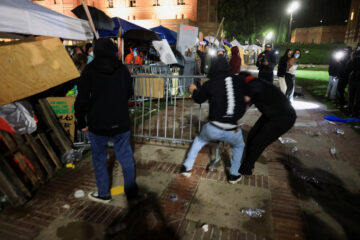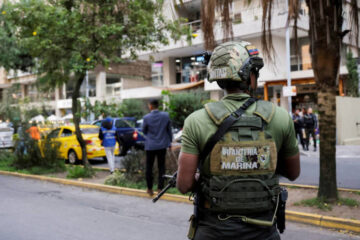Trapped in Gaza’s south, displaced Palestinians languish in winter
 A picture taken through a shrapnel hole in a building damaged by Israeli bombing, shows a woman and children standing outside, in Rafah in the southern Gaza Strip on January 27, 2024, as battles between Israel and the militant group Hamas continue. (Photo by AFP)
A picture taken through a shrapnel hole in a building damaged by Israeli bombing, shows a woman and children standing outside, in Rafah in the southern Gaza Strip on January 27, 2024, as battles between Israel and the militant group Hamas continue. (Photo by AFP)By Mai Yaghi AFP
It took Palestinian woman Umm Imad three days to reach Rafah, braving rain and cold weather in hopes of reaching safety as fighting rages across the besieged Gaza Strip.
But in the border town, on the Palestinian territory’s southern edge, the 70-year-old was forced to sleep rough like hundreds of thousands of other Palestinians displaced by the Israel-Hamas war, now in its fourth month.
“I didn’t find shelter, I didn’t find a tent, I didn’t find anything”, said Umm Imad, her black headscarf ruffling in the wind.
Heavy rains in recent days have given way to the return of a blue sky over the coastal strip, but the cold remains.
Rows of tents stretch into the distance behind Umm Imad, now a common sight all over Rafah.
Some of the tents are pitched along a hill of sandy earth, criss-crossed by barbed wire fences several meters (yards) high.
Many of the displaced Palestinians in Rafah have travelled there from Khan Yunis, southern Gaza’s main city about seven kilometres (four miles) to the north which has become the epicentre of Israel’s military offensive against Hamas.
“I spend the night in the street, under pouring rain, without shelter or anything, and I have orphaned children with me,” Umm Imad said.
Holding back tears, Abdallah Halas, 24, said: “I don’t know where we will go and sleep. Children, women, elderly and sick family members are in the streets.”
Nearby, streams of waste water flow through the streets littered with rubbish.
According to the United Nations, 1.3 million people — more than half of Gaza’s population of 2.4 million — are now trapped in Rafah, crammed together in “desperate conditions”.
On the 113th day of the war, sparked by Hamas’s October 7 attacks on Israel, Palestinians continue to move from one area of Gaza to another, fleeing fighting that began in the north before moving steadily south.
They move by foot, on donkey carts or crammed into the backs of diesel-powered trucks — a costly option with hardly any fuel left in Gaza.
Israel’s relentless bombardment and complete siege of the Hamas-ruled territory began soon after the attacks that resulted in about 1,140 deaths in Israel, mostly civilians, according to an AFP tally of official figures.
The Israeli campaign, according to the Hamas government’s health ministry, has killed at least 26,257 people in Gaza, most of them women and children.
– ‘Nothing left in Gaza’ –
In Rafah, drivers must go at walking speed as they make their way on the overcrowded streets.
Road-side vendors sell basic supplies: canned goods, mattresses, blankets and tents.
Similar items are being delivered into Gaza in humanitarian aid shipments, but these have slowed to a trickle since the war erupted.
A bag of potato chips costs eight shekels ($2) — an eight-fold increase from its pre-war price.
Hind Ahmed, 29, waited with her three children on a busy street in west Rafah, hoping to find a taxi or a donkey cart that would take her to her husband at a makeshift camp.
“We were staying in a school classroom for over a month… We shared the classroom with over 50 people, the air was polluted and the school is overcrowded”, she said.
“So we decided to go live in a tent despite the cold weather,” Ahmed said, her youngest son in one arm, a sponge mattress and a bag of clothes in the other.
The family has been displaced several times and their situation has become “illogical”, she said.
“Open the crossings and let us leave, there is nothing left in Gaza, no schools, no education, no basic life necessities.”
A man crossing the street interrupted, angrily shouting: “We will not leave Gaza. The (Israeli) Jews are the ones who came to us, they are the ones who must leave.”
Guterres: UN to punish staffers involved in ‘terror,’ urges UNRWA funding
By Michelle Nichols Reuters
United Nations Secretary-General Antonio Guterres vowed on Sunday to hold to account “any U.N. employee involved in acts of terror” after allegations that some refugee agency staffers were involved in the Oct. 7 Hamas attacks on Israel.
But Guterres implored governments to continue supporting the U.N. refugee agency for Palestinians (UNRWA) after nine countries paused funding.
“Any U.N. employee involved in acts of terror will be held accountable, including through criminal prosecution,” the U.N. chief said in a statement. “The Secretariat is ready to cooperate with a competent authority able to prosecute the individuals in line with the Secretariat’s normal procedures for such cooperation.”
At the same time, he said, “The tens of thousands of men and women who work for UNRWA, many in some of the most dangerous situations for humanitarian workers, should not be penalized. The dire needs of the desperate populations they serve must be met.”
In his first direct comments on the issue, the U.N. chief gave details about the UNRWA staffers implicated in the “abhorrent alleged acts.” Of the 12 implicated, he said, nine had been terminated, one was confirmed dead and the identities of the other two were being clarified.
Britain, Germany, Italy, the Netherlands, Switzerland and Finland on Saturday joined the United States, Australia and Canada in pausing funding to the aid agency, a critical source of support for people in Gaza, after the allegations by Israel.
“While I understand their concerns – I was myself horrified by these accusations – I strongly appeal to the governments that have suspended their contributions to, at least, guarantee the continuity of UNRWA’s operations,” Guterres said.
Adopting a sharper tone, UNRWA chief Philippe Lazzarini said, “It would be immensely irresponsible to sanction an Agency and an entire community it serves because of allegations of criminal acts against some individuals, especially at a time of war, displacement and political crises in the region. ”
In a statement he urged countries to reconsider funding suspensions. “The lives of people in Gaza depend on this support and so does regional stability,” Lazzarini said.









